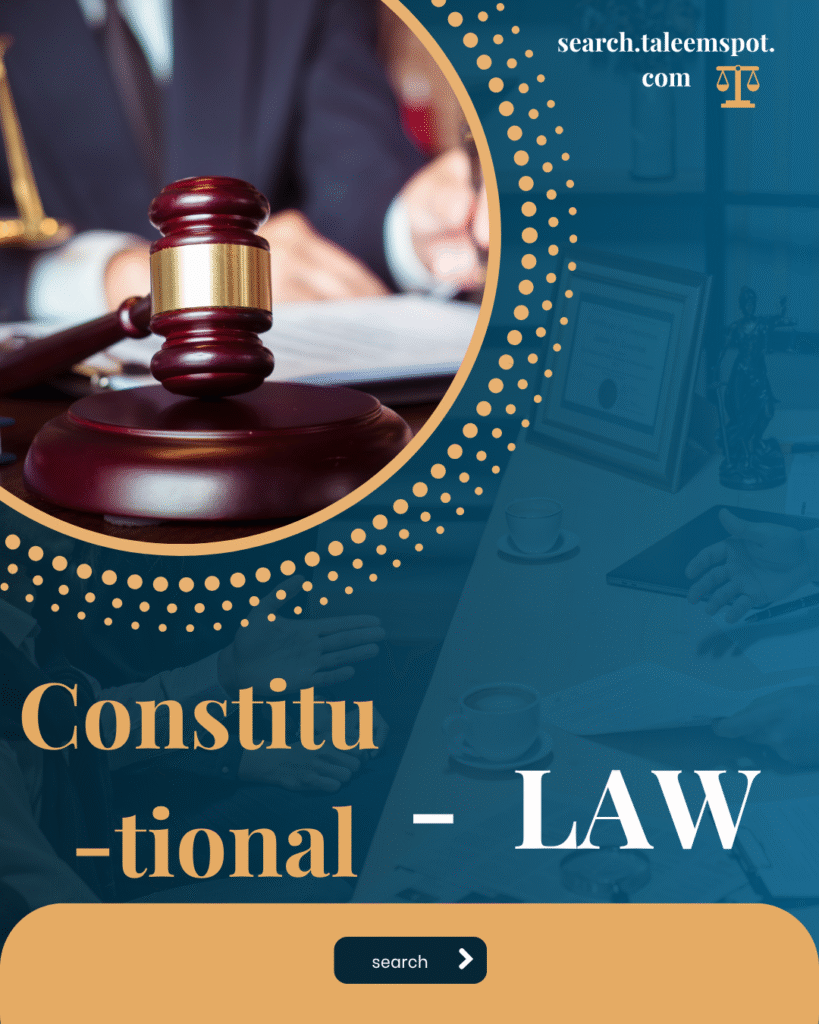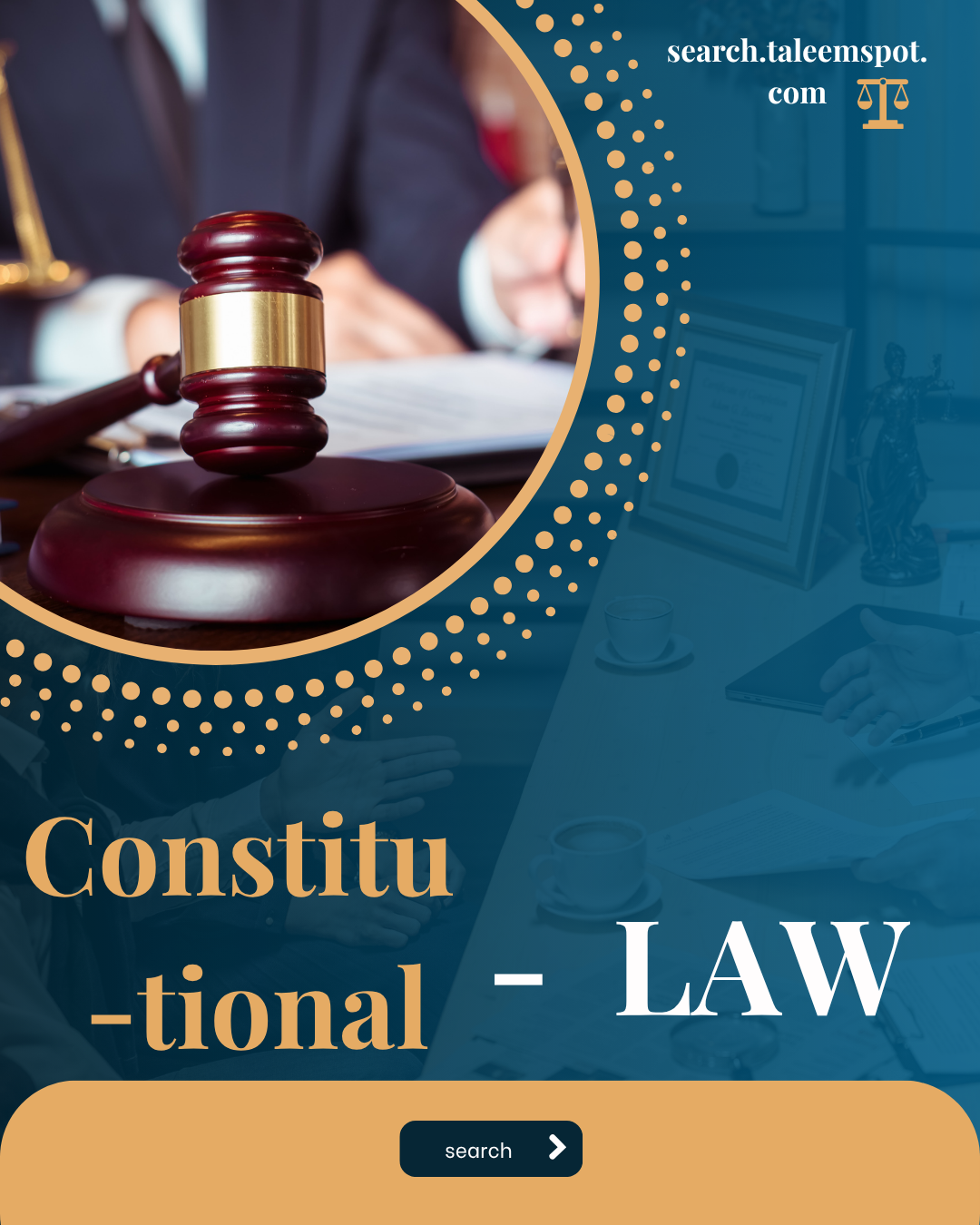📜 Constitutional Law: Foundation of Modern Legal Systems
“A constitution is not merely a document. It is the heartbeat of a nation’s legal and political identity.”
Constitutional law is one of the most fundamental areas of legal study and practice. It forms the cornerstone of a country’s legal framework, defining the structure of government, distributing power among its branches, and safeguarding the rights of individuals. Whether in a democratic republic, constitutional monarchy, or federal union, constitutional law determines the rules by which nations are governed.
This article offers a deep dive into what constitutional law is, its historical development, essential principles, key elements, and ongoing global challenges.
🧾 What is Constitutional Law?
Constitutional law is the body of law that arises from a country’s constitution—either written or unwritten—and governs the relationship between individuals and the state. It outlines the fundamental principles and legal norms that guide political governance, human rights, the rule of law, and the separation of powers.
Key Areas It Covers:
- The structure and powers of government (executive, legislative, judiciary)
- The rights and freedoms of citizens
- Electoral systems and democratic processes
- Judicial review and constitutional interpretation
🕰️ Historical Evolution of Constitutional Law
🏛️ Ancient and Classical Roots
Elements of constitutional thinking can be traced back to:
- Ancient Greece – Athenian democracy introduced ideas like citizen participation and legal equality.
- Roman Republic – Featured a system of checks and balances between consuls, the Senate, and popular assemblies.
📜 Magna Carta (1215)
Often cited as the origin of modern constitutionalism, it limited the power of the English monarch and laid the groundwork for the rule of law.
🏗️ Enlightenment Influence
Thinkers like John Locke, Montesquieu, and Rousseau argued for the social contract, popular sovereignty, and separation of powers—key pillars in modern constitutions.
🗽 Modern Constitutions
- U.S. Constitution (1787) – The world’s oldest written constitution still in force; introduced federalism, checks and balances, and judicial review.
- French Constitution (1791) – Reflected the revolution’s goals of liberty, equality, and fraternity.
- Post-colonial constitutions – After WWII, newly independent countries drafted constitutions influenced by Western models but adapted to local contexts (e.g., India, South Africa).

⚖️ Core Principles of Constitutional Law
1. Supremacy of the Constitution
The constitution is the highest legal authority. Any law or action that contradicts it is considered void.
2. Rule of Law
All individuals, including government officials, are subject to the law. No one is above the constitution.
3. Separation of Powers
Governance is divided among the executive, legislative, and judiciary to prevent the concentration of power and promote checks and balances.
4. Judicial Review
Courts have the power to assess whether laws or government actions violate the constitution and declare them invalid if necessary.
5. Fundamental Rights and Freedoms
Constitutions often enshrine rights such as:
- Freedom of speech and religion
- Right to equality and due process
- Protection against arbitrary detention
6. Federalism (in some systems)
Power is divided between a central government and regional governments (e.g., U.S., India, Germany), allowing for local autonomy.
📑 Types of Constitutions
🖊️ Written vs. Unwritten
- Written Constitution: Codified in a single document (e.g., U.S., India).
- Unwritten Constitution: Based on customs, judicial decisions, and statutes (e.g., United Kingdom).
🔁 Rigid vs. Flexible
- Rigid: Difficult to amend (e.g., U.S. Constitution requires supermajority).
- Flexible: Can be amended by ordinary legislative process (e.g., UK constitutional laws).
🧑⚖️ Constitutional Courts and Interpretation
Constitutional interpretation ensures that the constitution remains relevant and functional in a changing society. Methods include:
- Originalism: Interpreting the constitution based on original intent.
- Living Constitution: Treating the constitution as a dynamic, evolving document.
- Textualism: Strict adherence to the actual text.
Constitutional courts (e.g., U.S. Supreme Court, India’s Supreme Court, Germany’s Federal Constitutional Court) play a crucial role in:
- Enforcing constitutional rights
- Arbitrating disputes between levels of government
- Protecting democratic principles
🌐 Comparative Constitutional Law
Many countries share similar constitutional principles, yet their implementations vary widely due to culture, history, and political systems. Comparative constitutional law helps legal scholars understand:
- How different countries balance power
- Diverse models of judicial review
- The protection and limitation of rights in varying contexts
For example:
- India’s Constitution is the longest and blends British parliamentary democracy with U.S.-style fundamental rights.
- South Africa’s post-apartheid Constitution is lauded for its progressive rights and focus on social justice.
📌 Contemporary Issues in Constitutional Law
📱 Digital Rights
How do constitutional rights apply in cyberspace? Questions around privacy, freedom of expression, and surveillance are increasingly debated.
⚖️ Emergency Powers vs. Civil Liberties
The COVID-19 pandemic, terrorism, and war have tested the balance between national security and individual rights.
🧑⚖️ Judicial Overreach or Accountability?
When do courts go too far in interfering with politics? The line between judicial activism and judicial overreach is hotly debated.
🗳️ Electoral Reform and Representation
Issues like voter suppression, electoral college systems, and gerrymandering raise questions about how well democratic processes align with constitutional values.
📚 Why Study Constitutional Law?
Studying constitutional law is essential for:
- Lawyers and judges – to interpret and defend constitutional principles.
- Policy makers – to ensure laws align with fundamental values.
- Citizens – to understand their rights and responsibilities in a democracy.
It is not just a legal discipline—it is a study of political power, social justice, and national identity.
🏁 Conclusion
Constitutional law is the blueprint of legal order, the safeguard of liberty, and the mirror of a nation’s aspirations. It does not only define the structure of the state but also symbolizes its deepest values. In a time of rapid global change—technological, political, environmental—the resilience and adaptability of constitutional law are more vital than ever.
As Justice Louis Brandeis once said:
“The greatest dangers to liberty lurk in insidious encroachment by men of zeal, well-meaning but without understanding.”
Understanding constitutional law helps protect against those dangers—and ensures that power, in all its forms, remains accountable to the people.

